Sudan, in the Company of Men
It’s impossible to be a spectator in Sudan, especially on a bicycle. The entire country welcomes you, invites you in for tea, and warmly demands to know where you came from. From waving drivers to meals offered to shouts of “welcome!” from the roadside, the hospitality of the Sudanese is evident everywhere. So are their challenges, with daylong gas station queues clogging the streets and regular power cuts bringing businesses to a halt each afternoon. It’s a complicated place to live, and also to travel.
Sudan straddles the blurry boundary between northern and sub-Saharan Africa. It’s a vast country, home to a complex blend of hundreds of tribes and at least a hundred languages, in addition to the official language of Arabic. Religion is one thing nearly all Sudanese have in common, with 97 percent practicing some form of Islam. And these days, since the revolution in April 2019, there’s a cautious hope for change in the hot desert wind.
Anyone who’s been there will tell you it’s one of the friendliest and safest countries on the planet. Those who haven’t will raise their eyebrows and ask obliquely about crime and terrorism. Sudan seems to be a place that must be experienced to be believed. Thanks to the popularity of the famous Cairo to Cape Town route, one of the most common ways of experiencing Sudan (relatively speaking, for such a rarely visited country) is on a bicycle.
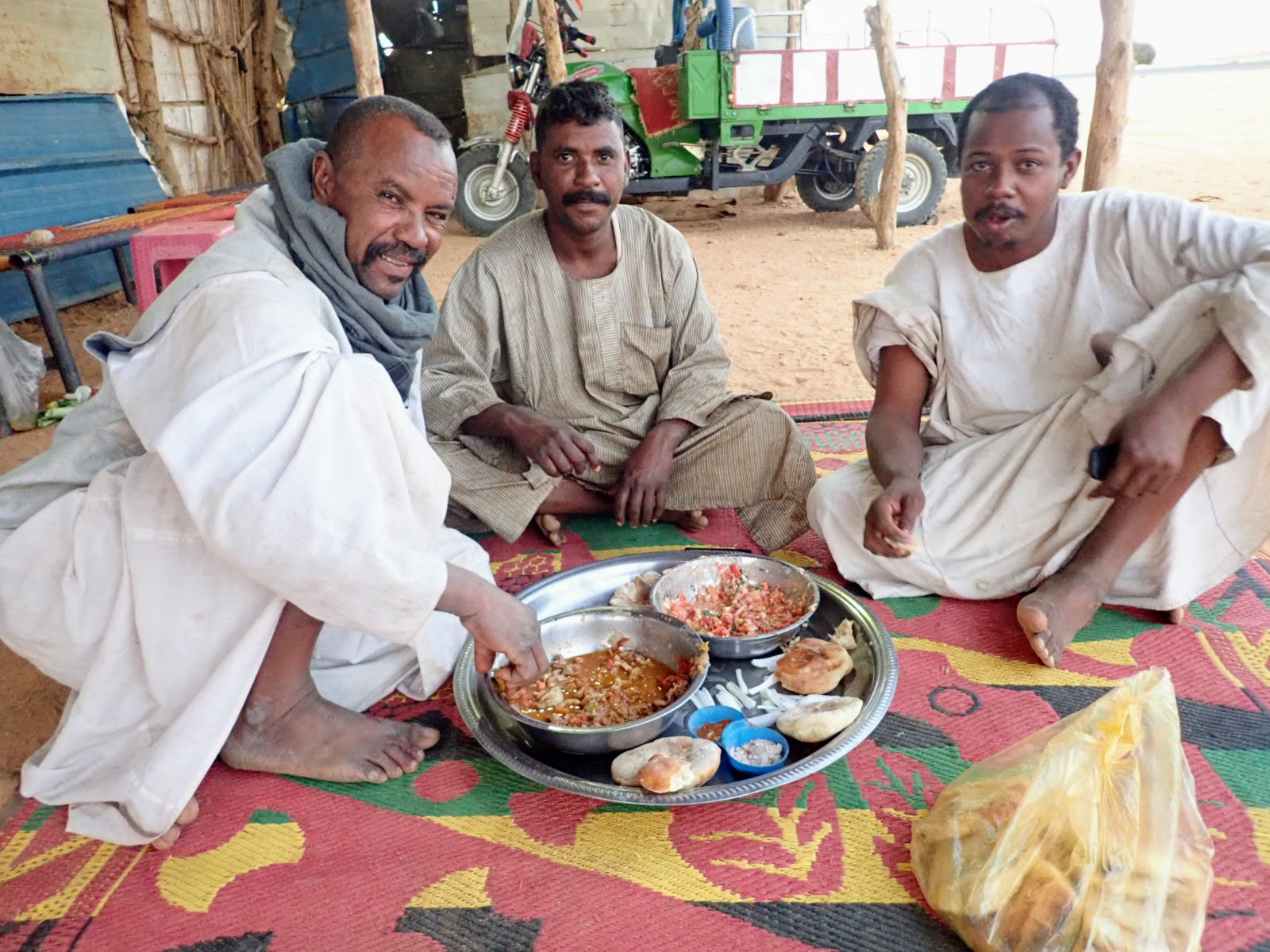
The story of Sudan is not mine to tell, and I could never do it justice. I can only describe how it reflected off of me in confusing glimmers as I rode my bicycle along the open highways, through peaceful villages, and down dusty city streets. It’s a story that surely has more depth than I managed to find, but my own story of Sudan revolves around the country’s relationship to my femaleness.
Though tiny cracks are beginning to show since the revolution, Sudan remains an ultraconservative Islamic country with some of the most restrictive gender roles and rules in the world. Until late 2019, Sharia-inspired laws were in place threatening women with flogging or arrest for wearing pants or showing their hair, and requiring permission from a male guardian for work or travel. The legal age of marriage for girls is 10. Riding a bicycle within sight of men is unthinkably scandalous for most Sudanese women, though this is probably the least of their daily concerns.
So what happens when a foreign woman shows up in Sudan alone, wearing pants, and riding a bicycle? As I learned, it’s complicated.
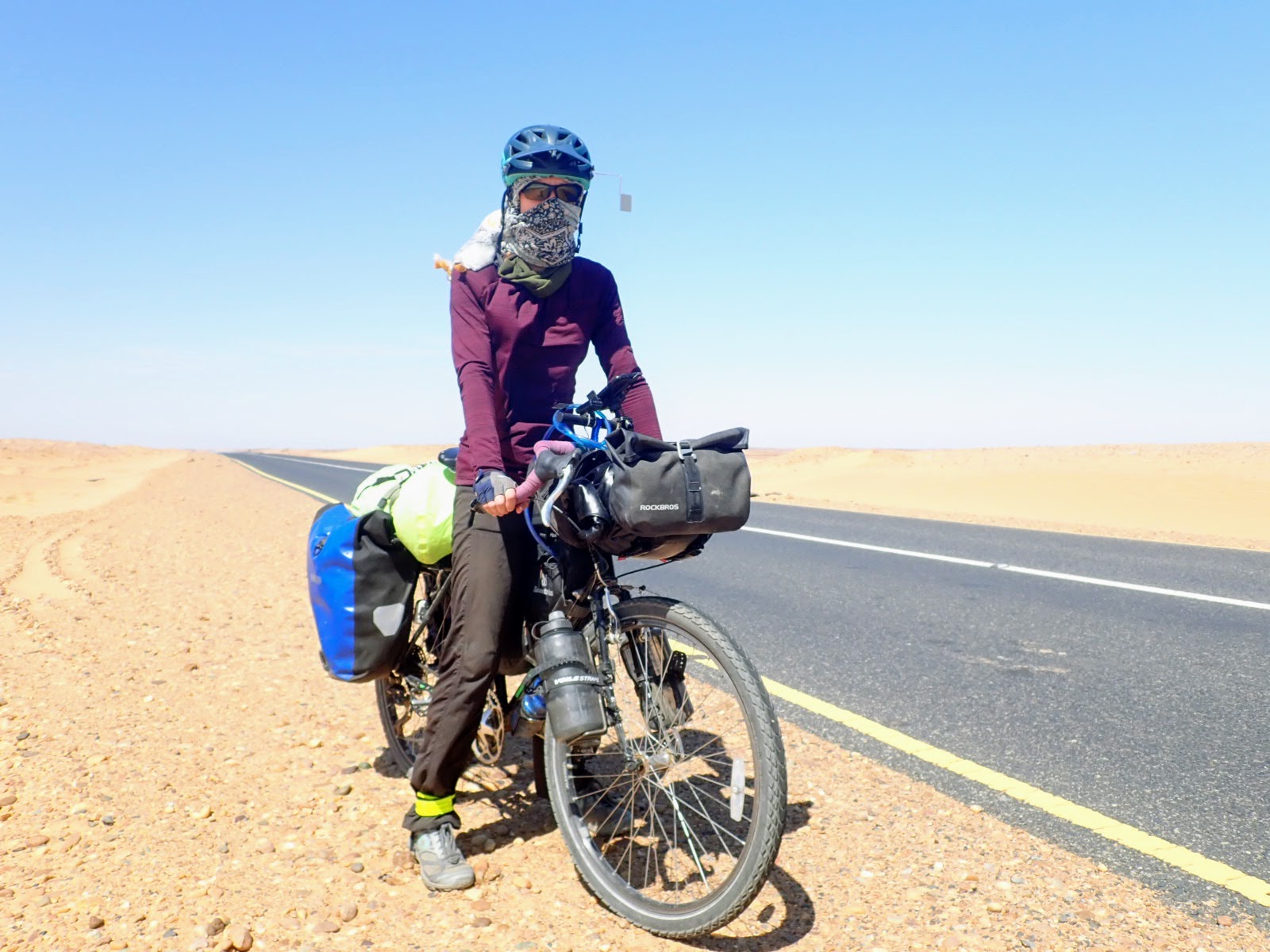
My pedal-powered journey took me from southern Egypt — a different and interesting story in its own right — into northern Sudan and the land of ancient Nubia. I followed the life-giving Nile and its relaxed villages south to Dongola before crossing the inhospitable desert eastward to the industrial city of Atbara. From there the pulse of Khartoum, Sudan’s capital city, seemed to grow stronger, sending ripples of its relatively progressive culture out along increasingly busy highways. Throughout it all there were ancient archaeological wonders, wandering camels, plentiful sweet tea, and — one of the first ways in which Sudan’s gender norms revealed themselves — lots and lots of men.
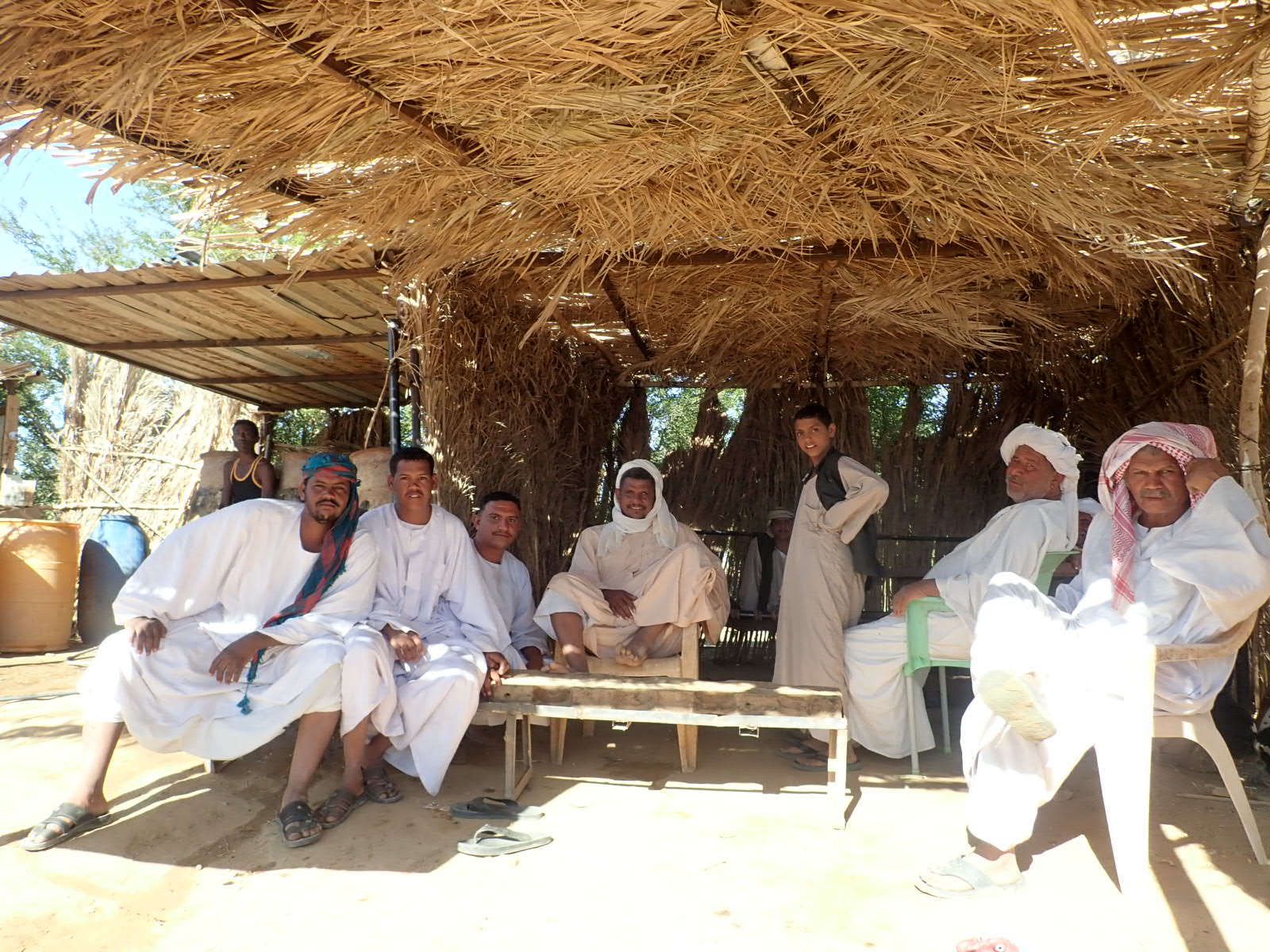
A traditional Sudanese woman’s role is emphatically confined to her home. People who travel in Sudan’s public spaces, visiting cyclists for example, will meet dozens of men for every one woman who ventures outside. For a country with so much open space, there seem to be men everywhere: drinking tea under thatched awnings at makeshift highway rest stops, waving from the tops of overloaded trucks, sometimes walking inexplicably in the middle of the sweltering desert miles from any settlement.
Sudanese men were almost always friendly, respectful, and kind to me. They stared with unabashed curiosity and chatted very eagerly in our halting combination of English and Arabic. I struggled to decode their enthusiasm in this place where certain assumptions are often made about foreign women and those who travel without male guardians.
After navigating a particularly friendly group of men sipping tea at a truck stop on a hot and tiring day, I finally realized what was wearing me down: I missed other women! I drank up the rare spark of friendly feminine energy — a shy smile or nod, or even just eye contact as I pedaled by — like a gulp of cool water after days in the scorching Sahara. Not usually one to dwell on my own femininity, I discovered a new appreciation for feminine energy in the deserts of Sudan.
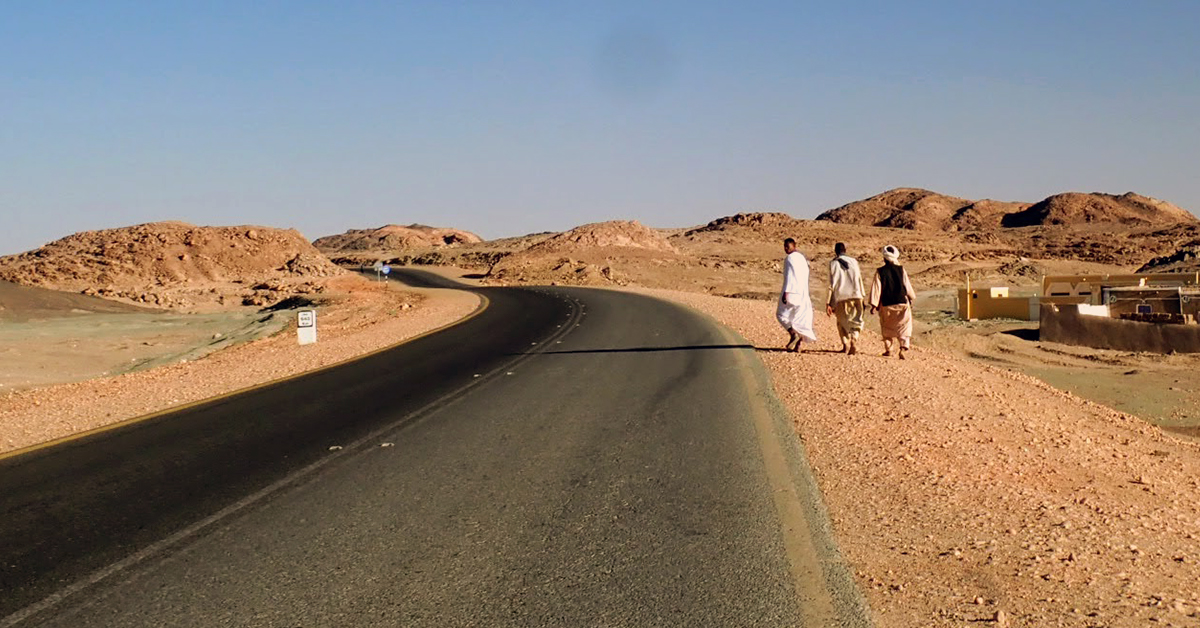
The ubiquitous men, combined with conservative Islam’s strict dress code for women, presented another challenge. In a country where local women can be flogged or arrested for the scandalousness of wearing pants, what’s a female cyclist to do? I wore pants, of course, but loose ones, and a long-sleeve shirt perpetually crusted with salty sweat stains. But what about that often misunderstood and controversial symbol of Muslim femininity, the headscarf?
In my best effort to respect the local culture, I dabbled with headscarves in Sudan. Hoping to signal politeness and lack of interest in romance, I would awkwardly throw one over my hair when removing my bike helmet before a group of staring men. It felt like playing dress-up. Honest feedback was hard to come by in such a polite culture, and I never did figure out whether anyone cared. I was treated well without my headscarf, and I was twice propositioned for sex while wearing it. I suspect that compared to everything else about me — my pants, my bicycle, my brazen soloness — the visibility of my hair hardly mattered.
In motion on the road, things were often simpler. Sometimes it felt like Sudan had literally sent out the welcoming committee. Where the highway drew close to the Nile and the peaceful town of Abri, a boy stopped abruptly and climbed down from his donkey cart. My guard rose slightly as he quickly walked toward me. Then he shook my hand, said “welcome” in the clearest English he could muster, returned to his donkey cart, and rattled off down the highway. He was the first of many Sudanese to approach me on the road — pedestrians, truck drivers, camel riders — to welcome me to their country and wish me a good journey.
The friendliness of Sudan’s people is matched only by the hostility of its landscape. Between Dongola and Karima, I cycled the most inhospitable stretch of land I’ve ever experienced — nothing but sandy desert for two days. I set off with 25 pounds of water that grew hot in the midday sun, providing little relief. I wrapped my scarf around my face against the hot wind that dried my mouth with every breath. Every half hour or so a car or truck would pass quickly, eager to be done with this nothingness and reach the next town. I spent most of the day counting the minutes until night, when I could pitch my tent in the sand and enjoy the falling temperature under a starry desert sky.
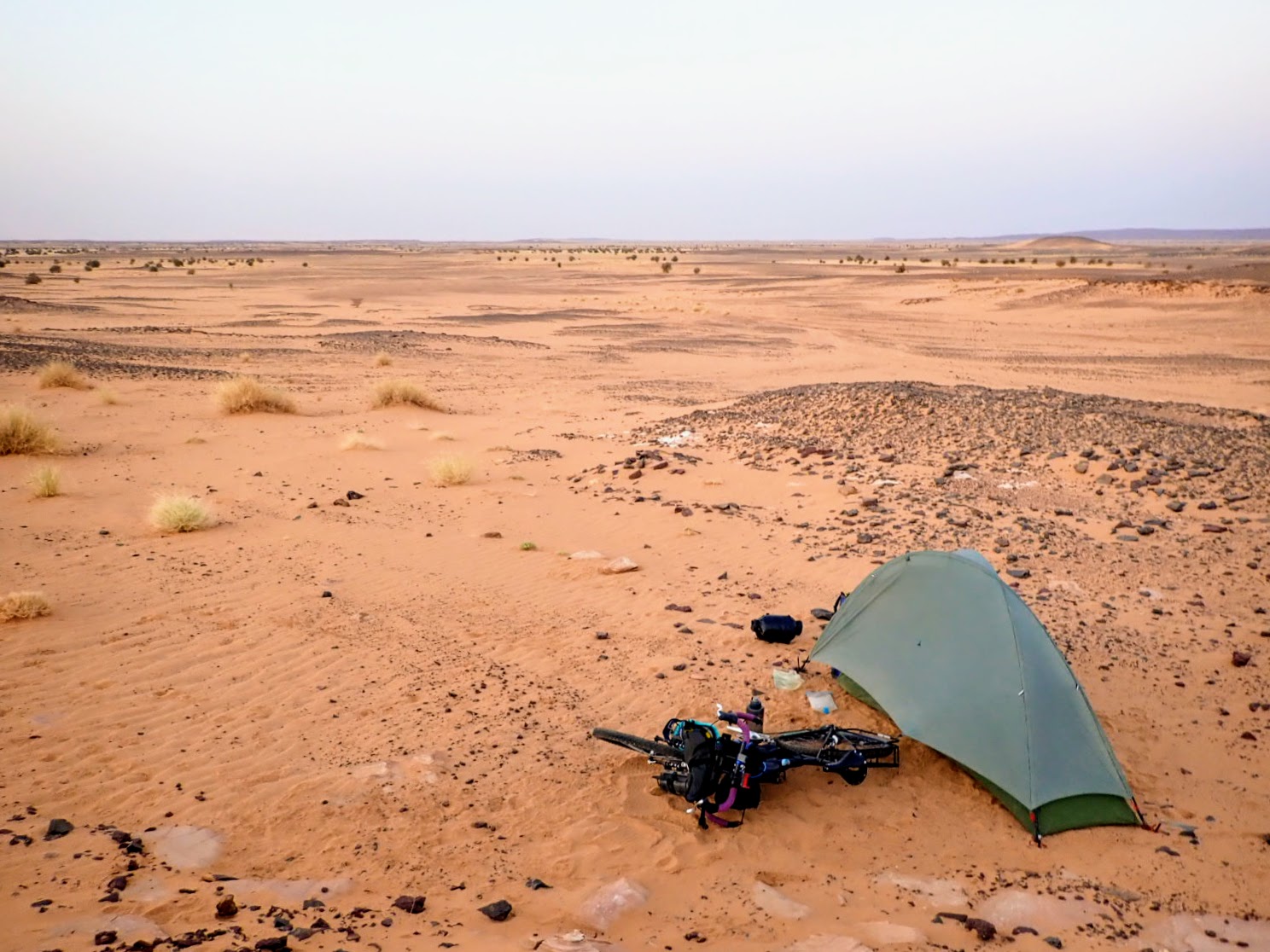
The next morning, smack in the middle of this empty desert, three boys sprinted across the sand to meet me at the road. Chattering excitedly, they pointed to a house in the distance and made the “drink tea” gesture. They led me to a compound overflowing with people. Dozens of young kids ran alongside the road, waving and shouting. I let their energy pull me off the pavement and into their sandy compound.
Having made their catch, the kids handed me off to an older man. He seemed important, the head of the whole family perhaps. He ushered me into a mud brick house and sat me down on a rope bed. First the usual Sudanese tea appeared and then a hearty breakfast. His eyes were bright and curious, and though he spoke no English, he was surprisingly adept with my Google Translate app.
We “talked” for hours this way, the boys and men crowding around eagerly. They seemed to be refugees of sorts, living away from their home due to some kind of tribal conflict. Every detail of my life that could be successfully translated was fascinating to them. Of course they wanted to know if I was married, and how many kids I have. My answer of “zero” got a hearty laugh when juxtaposed with the patriarch’s 24 children by four different wives.
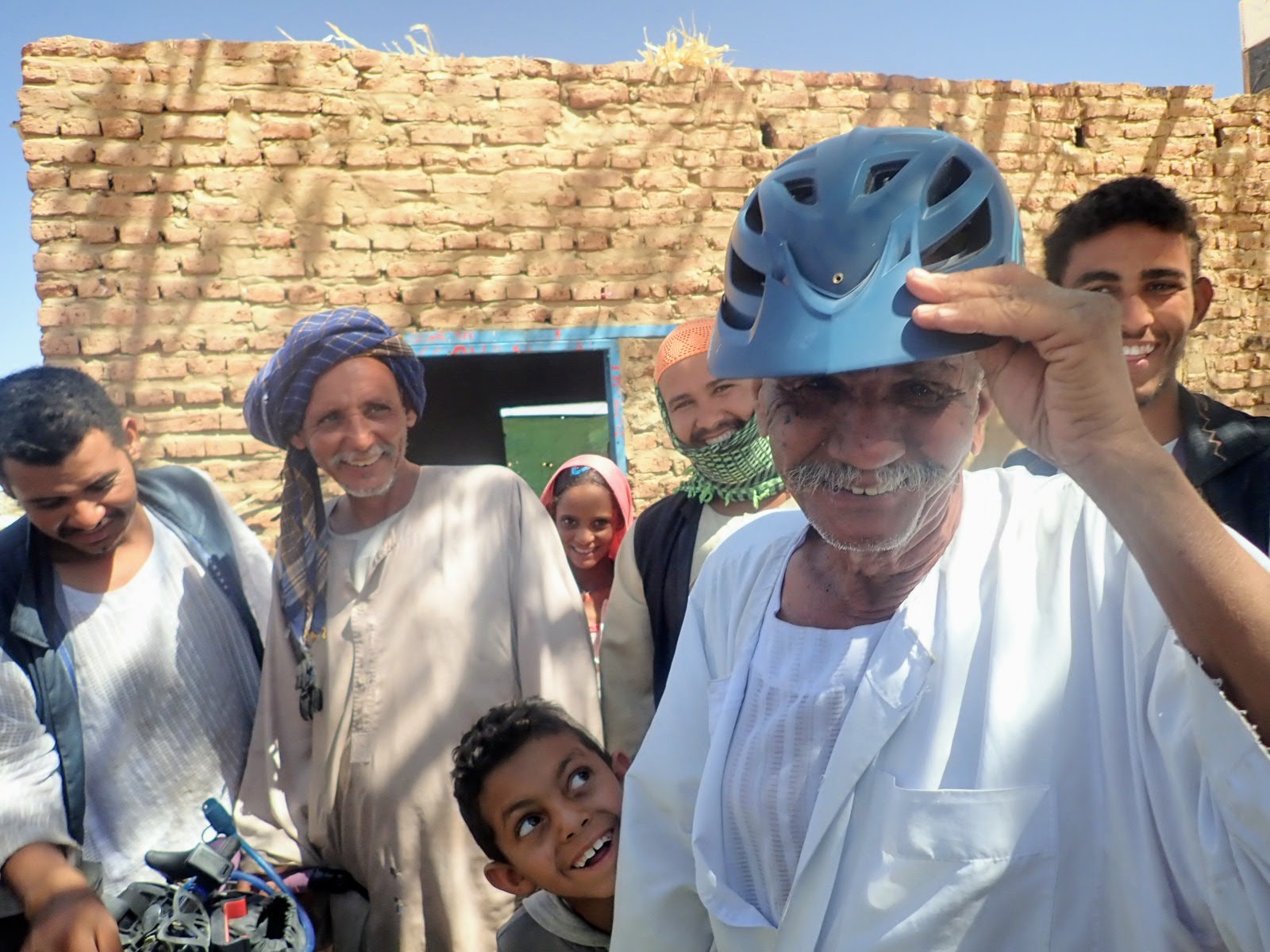
When it came time to leave, a group of women beckoned me over. They’d been outside the entire time I’d been sitting with the men and boys. We struggled through Google Translate to ask and answer one question — where are you from? — before the men came out and shooed them away. The women waved goodbye cheerfully, with no sign of frustration, as the men and boys swept me back to the road and helped pull my bike through the deep sand. I wondered later whether I should have protested and stayed to talk with the women, but it was too late.
The first time I really connected with a Sudanese woman was in Atbara, close enough to feel the beginnings of cultural ripples from Khartoum. I had just emerged from three days of rough desert crossing powered by a severely miscalculated food supply and rationed sips of sun-warmed water. I took a rest day at a budget motel to regain strength and passed the afternoon chatting with a young woman and her uncle who worked there.
The young woman didn’t speak English, but she was direct and outgoing, and she put me on the phone with her sister in Khartoum who did. It was the first time I’d heard a Sudanese woman speak English. We yelled and giggled back and forth over a horrible connection, barely understanding anything but thrilled just to hear each other. Then her uncle took my bike for a spin around the block. Though the young woman looked interested and fiddled with it curiously, she declined my offer to ride it.
Never before have I so strongly felt the privilege of my home country and culture, which somehow earned me a warm welcome while pedaling alone through a place where local women could be arrested for doing the same.
The next day I met another Sudanese woman at the bus station as I sought to skip a dangerous section of busy road. She wore a flowing black hijab and carried a black roller suitcase, and she smiled instantly when our eyes met. Through Google Translate, I learned she was 20 years old, married to a man living in another town, and returning to university in Shendi where she studies Arabic.
Her demeanor, while polite and proper, was a world away from the reserved women I’d seen in rural villages. She boarded the bus first, saved me the seat next to her, and told the driver where to drop me off. She showed me pictures on her smartphone of herself and friends dressed up with their hair uncovered. We posed for selfies together as the bus rattled along, a first after meeting plenty of Sudanese women who preferred not to be photographed. I marveled at the contrast between young and old, urban and rural, educated and unable to afford education. So this is the new generation of urban Sudanese women!
The pulse of Khartoum continued to push its progressive culture outward as I pedaled toward it. At an archaeological compound near the Meroe pyramids, I met three Sudanese women from Khartoum who were wearing … I could barely believe it … pants! One of them was drawn to my bike and bold enough to climb on in the safety of the walled compound. The bike was fully loaded, stuck in sand, and shifted into the wrong gear; it wobbled hopelessly and refused to budge. I felt badly that I hadn’t managed to give her a wildly successful experience in exchange for her boldness, but I was so glad she’d been willing to try.
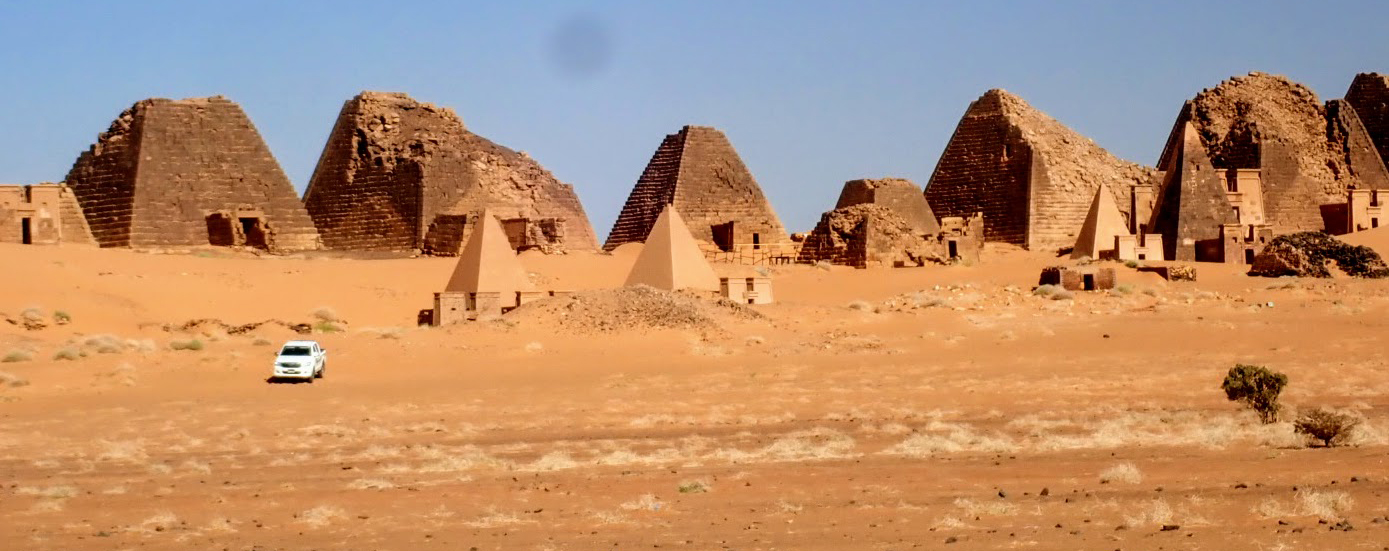
In Shendi, a university town just three hours’ drive from Khartoum, I saw a woman driving a car! What surprised me wasn’t the sight itself but the realization that I hadn’t seen a female driver in weeks. The town’s sidewalks were filled with university students, both female and male, walking and chatting comfortably. I felt the burden of culture shock ease just a bit as I pedaled through and crossed the bridge to the west bank of the Nile.
South of Shendi, a man on a motorbike pulled alongside me on a quiet road, and I finally got the answer to a question I’d been wondering about. Standing face to face, he puzzled over my incomprehensible mix of feminine form with manly clothing and a man’s freedom. Still unsure, he asked in broken English, “woman or boy?” Surprised but not displeased with my answer, he handed me a good luck charm from his front pocket and zoomed away with a wave.
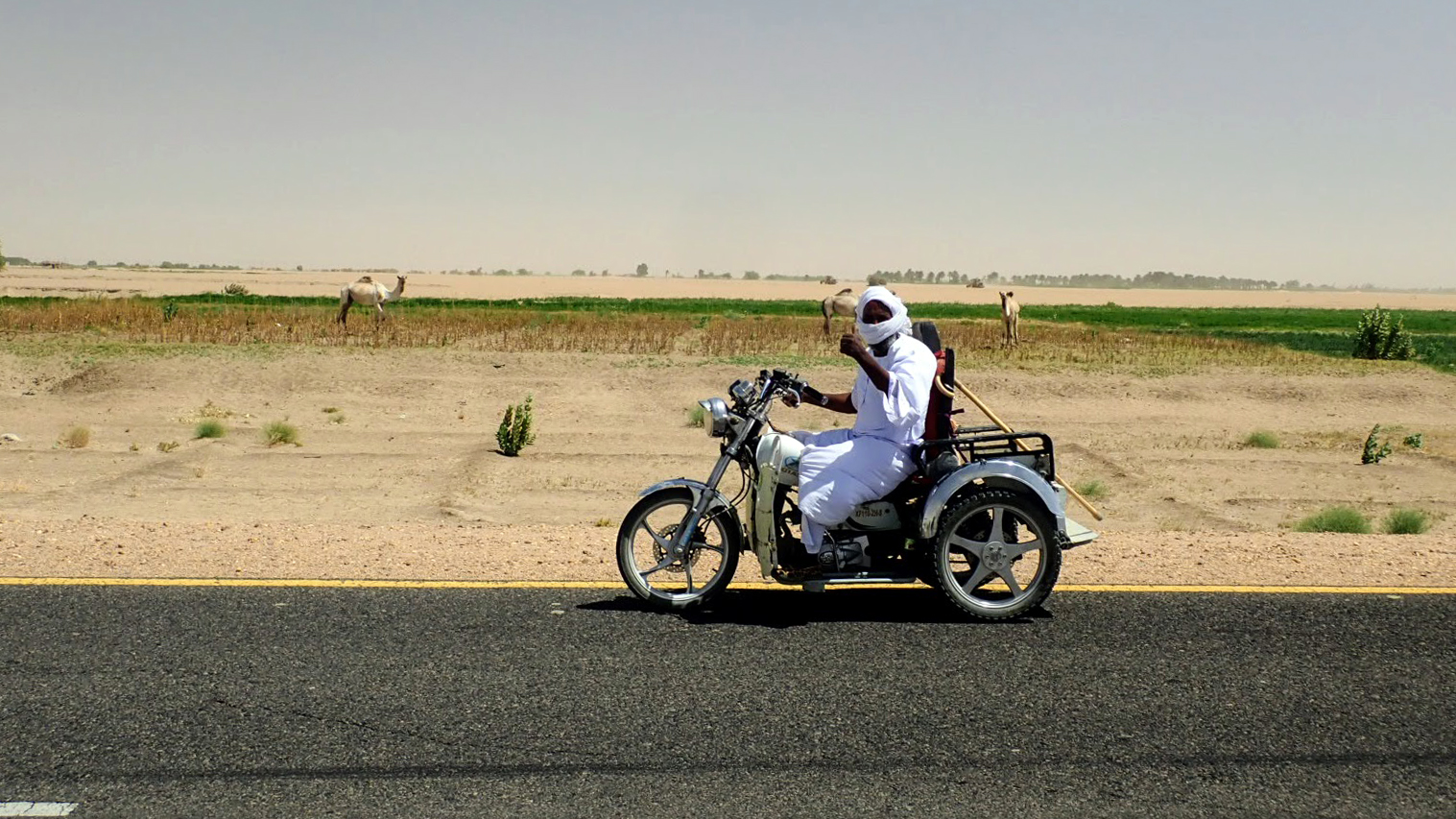
Throughout Sudan I enjoyed some gorgeous, quiet nights under the stars. I camped alone in the desert on several occasions, surrounded only by endless sand, and felt comfortable. But here, on the edge of the Khartoum suburbs, it no longer felt right. Unable to find a stealthy campsite, I stopped at a small restaurant in town. A friendly group of men welcomed me and invited me to camp. The owner swept the dirt floor, brought a bowl of soup, and steadfastly refused my money.
That night, despite the lack of any warning signs during our earlier interactions, I woke to a hopeful man reaching for my tent zipper. His assumptions about a solo woman were uncomfortably clear as I shined my headlamp in his face, hoping my pronunciation of the Arabic word for “no” was clear enough. Apparently it was; he went back to his bed in the corner and soon I could hear him snoring. No such luck for me. I sat awake with my adrenaline pumping in the hot sticky air of my tent, letting the strain and confusion of the last few weeks wash over me.
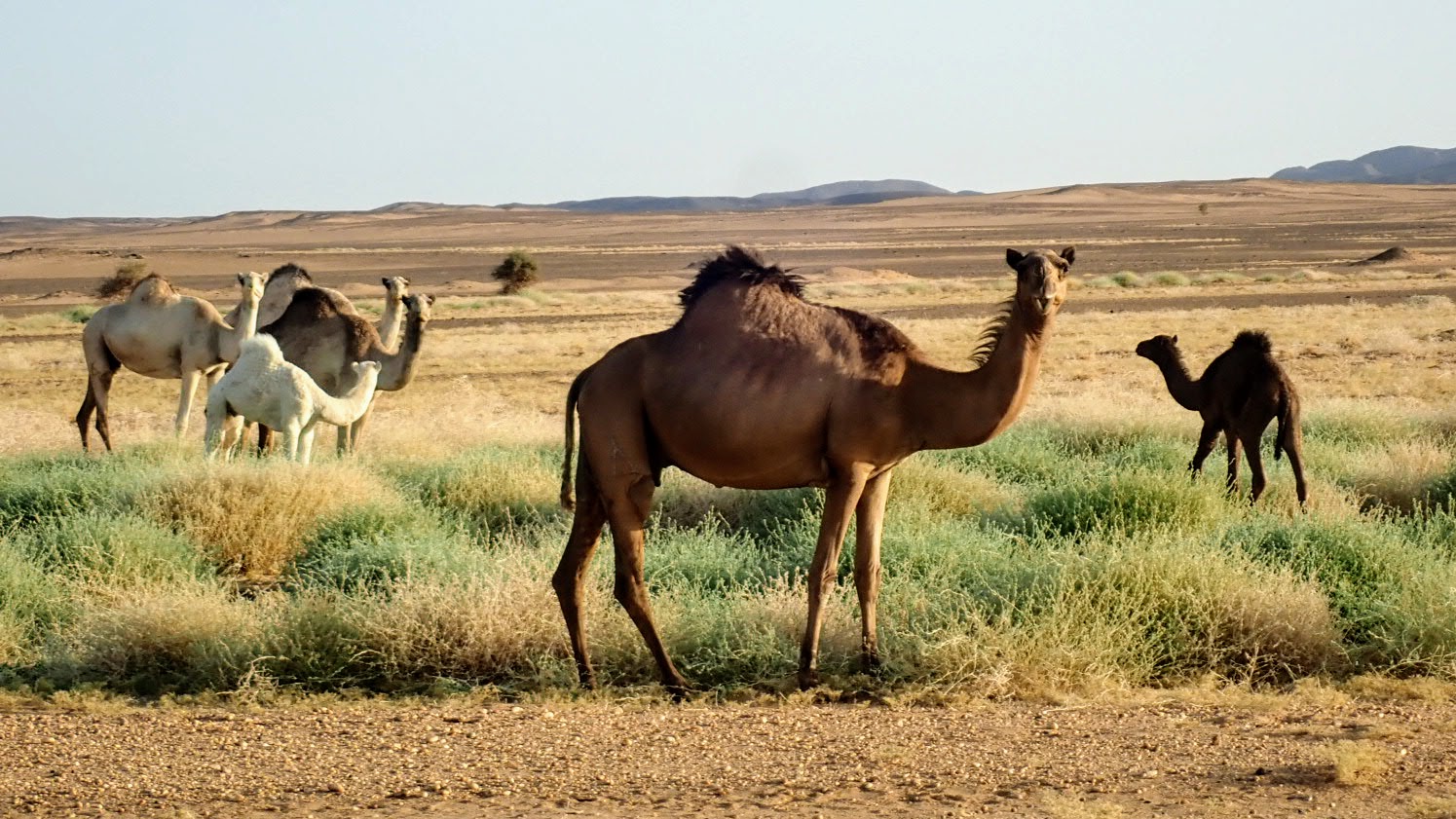
The next morning I couldn’t get away from his staring eyes fast enough. I packed as fast as possible, confused by the lack of acknowledgment from my host about what had transpired. He was as friendly as ever and still refused payment for the food I’d eaten the night before. Sudanese hospitality is truly unflappable. I pedaled away hungry and saved breakfast — my last remaining piece of bread and Laughing Cow cheese wedges — for the solitary shade of a drainage ditch 10 miles down the road.
That day, my last day of cycling in Sudan, delivered 100 kilometers of chaotic traffic and a scorching headwind. In the middle of a particularly busy, dusty, hot stretch of road, my back tire went flat. I retreated behind some bushes to fix it, but immediately three men appeared out of nowhere. This is the female cyclist’s curse: anywhere in the world, we seem to be no more than a few hundred feet from a man who thinks we need help fixing a flat. These men defied my expectations though, lending a hand where needed and otherwise simply watching encouragingly, ready to cheer when the new tube held air.
As I fought my way into the gridlocked city block by dusty block, I felt as if I’d just entered a different country. Fast food restaurants appeared, and air conditioned buildings, traffic lights, even a high-rise or two. The streets were flowing with people but, for once, they mostly ignored me, which was a gift in my overwhelmed state. When traveling by bike in such an exposed way, sometimes the thing I crave most is to not be seen.
What caught my attention most in Khartoum, when I had any attention left to catch, were the women. They were everywhere! There were women walking out of shops, women in groups, women alone, young female students waiting for the bus, a woman driving a car. One confident young woman, only her eyes visible beneath an elegant black niqab, reached out and shook my hand as I waited near the sidewalk in a chaotic mob of traffic.
A few blocks from my lodging, I finally stopped and treated myself to my deepest craving: a cheeseburger. The power was out and they had no drinks, so I found an ice cream shop with a generator and ordered a chocolate milkshake. Covered in dust and salty sweat stains, I folded my tired body onto a low ledge and devoured my feast in a daze. I had done it: I had ridden from Luxor to Khartoum. I had cycled through northern Sudan.
The next couple of days in Khartoum were a whirlwind of serendipitous connections and rapidly changing travel plans. I scrambled to pack my bike and fly home as the world started shutting down in mid-March of 2020. My timing was incredibly lucky — I managed to fly out of Khartoum on the last day before they suddenly closed the airport in response to the pandemic. When not packing, I spent my time talking with expats I’d connected with on the road. Finally able to converse in English with people who know Sudan well, I was eager to learn about the country’s political situation in more detail.
In April 2019, after several months of peaceful protests, Sudan’s oppressive ruler of 30 years was overthrown in a demand for civilian democracy. The path since then has been rocky, with limited success. Two days before I rode into Khartoum, there was an assassination attempt on the prime minister of the transitional government, yet everything had mostly blown over by the time I arrived. Some say the revolution is losing steam, mired in the mess of a failing economy. The challenges were unmistakable even to a foreigner just passing through: lines for days at empty gas stations, crowds at the bakeries, power cuts every afternoon.
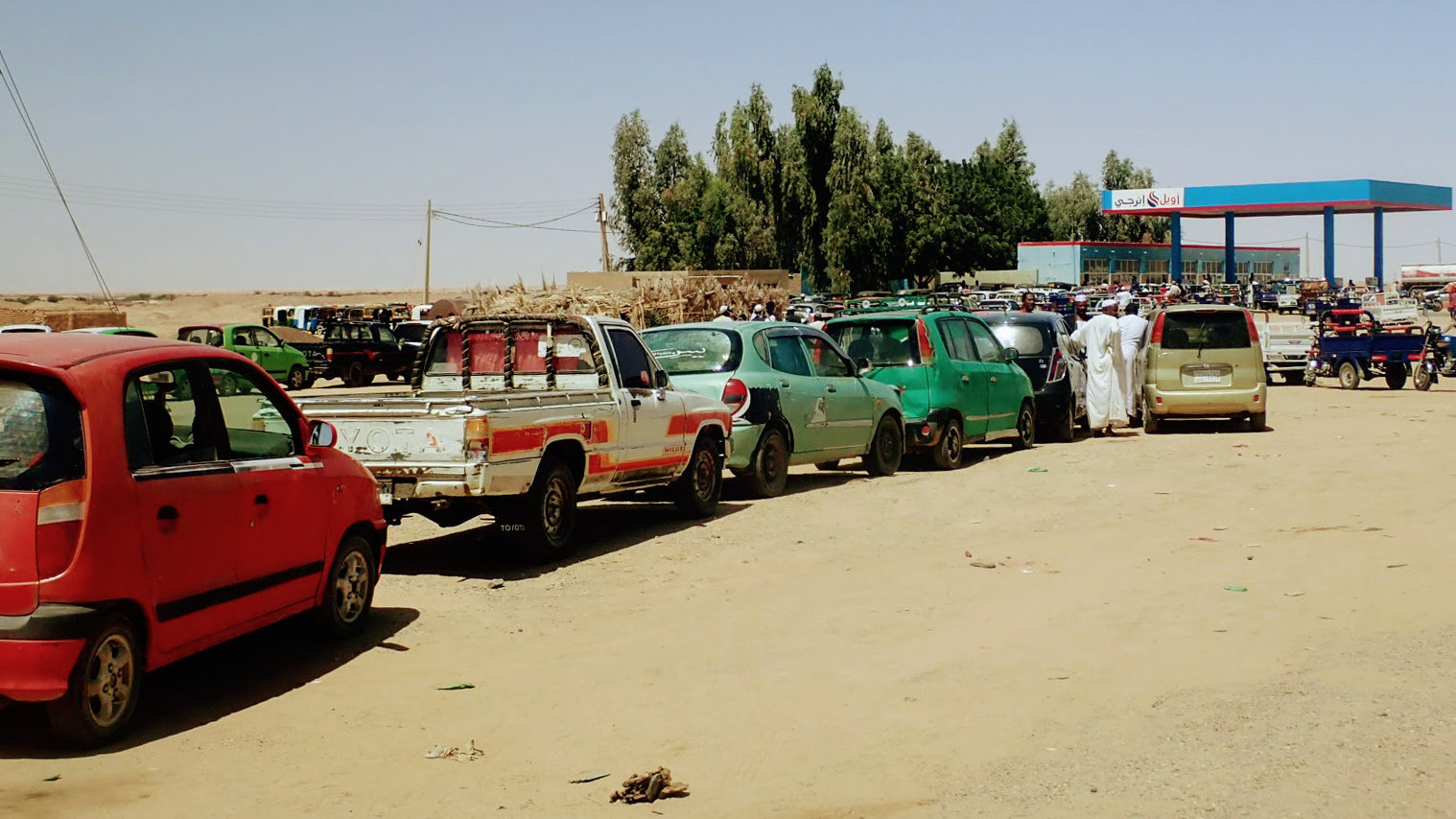
The women of Sudan, especially in Khartoum, have seized the moment and are not ready to give up hope. Women were prominent figures in the protests that catalyzed the revolution, though they have since been largely excluded from key roles in the resulting transitional government. In late 2019, the transitional government repealed the Sharia-inspired “family law” that oppressed women in many ways, from making it illegal to wear pants to limiting public activities like dancing and selling goods on the street.
Cycling alone through vast swathes of public space as a woman is never simple, but in Sudan it’s a defining feature of the experience, as being female is a defining feature of a Sudanese woman’s daily life. Never before have I so strongly felt the privilege of my home country and culture, which somehow earned me a warm welcome while pedaling alone through a place where local women could be arrested for doing the same.
In Sudan, as in many places I’ve visited, a solo female traveler is granted “honorary man” status and the license to do many things local women cannot. I’m thankful to the men of Sudan (most of them at least) for putting aside their assumptions, surprise, and whatever other thoughts I evoked to welcome me to their country. And I’m grateful to the women of Sudan who reached out warmly with recognition of something important shared between us, despite the painfully obvious unfairness of our differing circumstances.
The story of women and bicycles in Sudan is nascent but growing against all odds. Since 2016, a group of brave women in Khartoum have been using cycling to further women’s rights. They wear pants and ride donated bicycles through chaotic city streets to both cheers and harassment because they understand that riding a bicycle is a form of freedom. Though my own relationship to cycling is far simpler than theirs, I couldn’t agree more, and I’m cheering for their success from half a world away.

